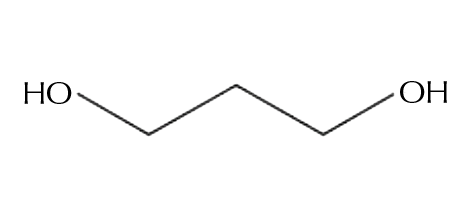What Is Propanediol?
Propanediol is a naturally derived ingredient that is used in cosmetics and skincare to improve the texture and feel of the formulation. As an emollient propanediol also helps the skin to retain moisture and hydration. Propanediol is mainly used for its texture improving benefits but has added extra benefits. The lack of direct benefits to the skin may be why you haven’t heard of propanediol before.
Propanediol is a glycol also known as 1,3-propanediol. Propanediol has a similar structure to another skincare ingredient, propylene glycol or 1,2-propanediol. While the difference between these two ingredient’s structure and names may be subtle, the small difference makes for different uses and safety profiles.
Propylene glycol is a synthetic ingredient made from petroleum or corn and are highly purified products. This ensures that there are no impurities in the final product. Since propanediol can be produced from a natural source, it is used as an alternative to petroleum-derived glycols. The process of making propanediol from corn is more energy-efficient than conventional petrochemical processes. It produces a smaller environmental footprint, requires lower operating costs, and has greater sustainability due to the use of renewable corn feedstock. Thus, propanediol is an appealing ingredient for companies that produce natural and “green” personal care products.

Propanediol
the good:Helps hydrate the skin and improve the texture and feel of formulations.
the not so good:Propanediol doesn’t cause irritation or sensitivity so nothing to look out for here.
Who is it for?All skin types except those that have an identified allergy to it.
Synergetic ingredients:Works well with most ingredients
Keep an eye on:Be mindful that propanediol is not usually a key ingredient, its moisturizing properties are mostly a byproduct of its texture enhancing.
What Are The Benefits of Propanediol?
In cosmetics and skincare products, propanediol helps to improve the texture and sensory feel of the product. It also has added benefits for hydration, moisturization, and may be beneficial for hair care products too.
Protective
As an emollient, propanediol has the ability to soften and soothe the skin. Upon application, propanediol forms an occlusive or protective film on the surface of the skin that aids in preventing water loss to the air or dry environments. Over time, this increases skin hydration by causing a buildup of water in the top layers of the skin, helping to support the skin’s natural water levels. Products that contain propanediol, such as creams, lotions, and moisturizers, are an excellent choice to support dry skin.
Hydration
Propanediol also functions as a humectant. A humectant is a water-loving substance that pulls water into the skin. Humectants attract and retain the moisture from the air nearby via absorption, drawing the water vapor into or beneath the surface o the skin. Once again, these properties make propanediol an ideal ingredient for dry or dehydrated skin.
Anti-aging
Those with aging skin can also benefit from humectants since the skin naturally loses hydration with age. As part of the normal aging process, there is a significant decrease in the amount of Natural Moisturizing Factor found within the epidermis. The Natural Moisturizing Factor is comprised of natural humectants, as well as amino acids, PCA, lactates, sugars, salts, urea, and peptides. All of these substances work together to keep the skin’s surface intact, supple, and hydrated. When the Natural Moisturizing Factor becomes depleted, the skin appears dry and flaky and is more susceptible to wrinkle formation. Applying products that contain humectants like propanediol can keep skin hydrated while working to reduce signs of aging.
Haircare
These same hydrating properties of propanediol make it a useful ingredient for hair care products, such as shampoo, conditioner, leave-on conditioners, or styling products. It provides a cleaner feeling after rinsing while potentially increasing moisturization, improving detangling, reducing static, and improving wet and dry combing.
Solvent
Lastly, propanediol functions as a solvent. It is considered to be an excellent solvent for harder to dissolve ingredients, such as salicylic acid, ferulic acid, allantoin, and ascorbic acid. Propanediol provides a light, non-sticky, slightly dry skin feel.
Is Propanediol Safe?
Propanediol is considered a safe and appropriate ingredient not only for cosmetic products but also for ingested food products. Propanediol is certified as a ‘Generally Recognized As Safe’ ingredient by the United States Food and Drug Administration. In two independent human skin patch tests, propanediol at concentrations as high as 75% did not produce skin irritation or sensitization reactions. The Cosmetic Ingredient Review Expert Panel, a group responsible for evaluating the safety of skincare ingredients evaluated the available data and determined that propanediol is safe for its indicated uses in skincare and cosmetics.
Other Uses
As Healthline discusses in their article on propanediol, the ingredient has many other uses including in manufacturing and is used in printer ink, skincare, and antifreeze.







